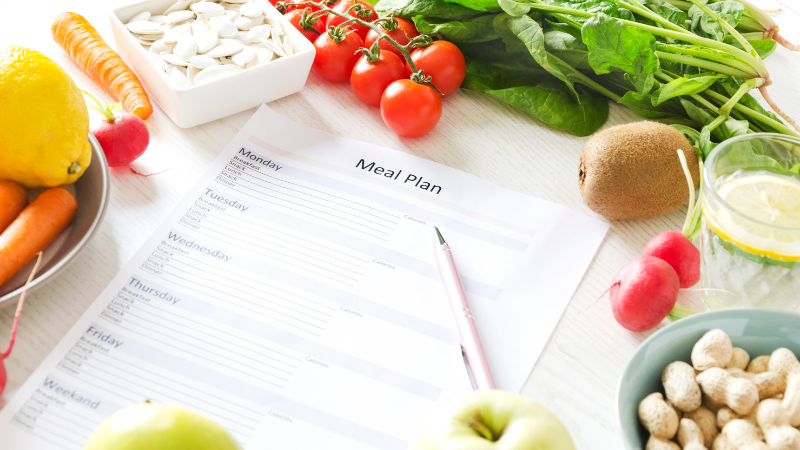Are you looking to add some healthy pounds and achieve your weight goals? Our comprehensive guide on gaining weight quickly, safely, and healthily is here to help. With expert advice and guidance, this article provides valuable insights to those who want to gain weight while prioritizing their overall well-being.
In the first part of the article, we'll talk about the importance of increasing caloric intake and following a balanced diet such as a whole food plant-based diet. We'll share practical tips on how to consume more calories without compromising nutrition.
We'll also emphasize the significance of regular exercise for healthy weight gain, dispelling the misconception that exercise is only for weight loss.
This article aims to provide evidence-based information and practical strategies to help you increase your calorie intake effectively.
The second part of the article will focus on meal planning and preparation as essential tools for healthy weight gain. We'll provide examples of delicious and nutritious snacks to make smart choices throughout the day.
We'll also highlight the importance of addressing any underlying health issues that may affect your ability to gain weight.
This article stresses the need for professional guidance and support when necessary and advises against unhealthy weight gain practices. By following this quick, safe, and healthy guidance, you can achieve your desired weight goals while taking care of your overall well-being.
Key Takeaways
- Healthy high-calorie density whole food plant-based sources for healthy weight gain.
- Gradual and sustainable weight gain is important for optimizing health outcomes.
- Consult with a healthcare professional or registered dietitian for personalized guidance.
- Address underlying health issues that may be hindering weight gain progress.
Tips for Increasing Caloric Intake
Looking to pack on some pounds? Check out these quick and easy tips for upping your calorie intake. When it comes to sustainable weight gain, consuming additional calories from healthy foods and whole food, plant-based sources is the key.
- Start by incorporating more nutrient-dense foods into your diet. This may include fruits, vegetables, whole grains, pulses and legumes, nuts and seeds regularly
- Focusing on adding healthy fats to your meals and snacks. Avocados, nuts, seeds, and tofu are all excellent sources of healthy fats that can help boost your calorie intake without sacrificing nutritional value.
- Opt for high-calorie protein sources such as lentils, chickpeas, edamame, tofu, tempeh, legumes, nuts and seeds. These foods not only provide essential nutrients but also contribute to muscle growth.
- Incorporating calorically dense carbohydrates into your meals is another effective way to increase caloric intake. Whole grains like brown rice and quinoa are great options, providing fiber and other essential nutrients while adding extra calories. Including starchy vegetables like sweet potatoes or corn can also help you achieve your daily calorie goals.
- Aim for strength training exercises at least two times per week in addition to cardiovascular activities.
To ensure a well-rounded approach to weight gain, make sure to maintain a healthy lifestyle overall. Regular exercise coupled with a well-balanced whole food plant-based diet promotes muscle growth and helps optimize weight gain efforts.
Remember that gaining weight in a healthy manner takes time and patience. It's essential to focus on nourishing your body with nutritious whole plant foods rather than resorting to unhealthy processed snacks or excessive sugary drinks that may lead to unwanted health consequences in the long run.
Balanced Diet Recommendations
Start by incorporating a variety of nutrient-rich whole plant foods into your daily meals, ensuring you're getting a balanced mix of proteins, carbohydrates, and fats. A balanced whole food plant-based diet is crucial for reaching your weight gain goals in a healthy way.
Dr. Michael Greger’s Daily Dozen is a list of the healthiest foods to include in your diet for optimal health. Apart from exercise, here are 10 of the top healthy foods from Dr. Greger’s Daily Dozen that you should include for optimal health.
Leafy Greens
Leafy greens are an essential part of any healthy diet. Although leafy greens are low in calories, they are high in fiber, vitamins, minerals, and antioxidants.
Some of the best leafy greens to include in your diet are kale, spinach, amaranthus greens, malabar spinach or basale, coriander leaves, and pudina or mint leaves.
Cook them with some healthy fat like nut butters to best benefit your weight gain journey
Cruciferous Vegetables
Cruciferous vegetables are a great addition for optimal health. They are high in fiber, vitamins, minerals, and antioxidants.
Cruciferous vegetables are the most powerful anti-cancer vegetables we today.
Cruciferous vegetables include broccoli, cauliflower, cabbage, Brussels sprouts, kale, bok choy, radish, turnip, mustard leaves and arugula.
Toss them up some healthy fat like nut butters and delicious spices to best benefit your weight gain journey
Other Vegetables
Other vegetables are also important, whether they root vegetables like carrot or pod vegetables like okra.
Vegetables are packed with vitamins, minerals, and antioxidants. They can help you feel full for longer periods of time and provide essential nutrients that your body needs to stay healthy for longer.
Some other vegetables to include in your diet are potatoes, sweet potatoes, carrots, brinjal, okra, sweet pumpkin among others.
You can make gravies, stir fried vegetables, baked veggies with nut butters and plant-based cheese.
Pulses and Legumes
Pulses and legumes are an important part of any healthy diet, especially for those looking to gain weight.
They are rich in fiber, protein and a type of starch called resistant starch.
Resistant starch helps to slow down digestion and keep you feeling full for longer periods of time, and also build up your good gut bacterial colonies. This can help build a healthy gut that improved absorption and help you move towards your ideal weight.
Some of the best pulses and legumes to include in your diet are chickpeas or chana, lentils or dals, kidney beans or rajma, black-eyed peas or cowpeas, whole green moong, double beans, fava beans, and brown chana.
Don't forget to have nut butters for healthy fat in your dals and gravies.
Nuts and Seeds
Incorporating nuts and seeds into a weight gain plan is beneficial due to their richness in healthy fats, protein, dietary fiber, vitamins, minerals, and antioxidants.
Nuts can help you add beneficial fats and calorie dense foods without compromising on your health.
Some of the best nuts and seeds to include in your diet are almonds, walnuts, pistachios, flaxseeds, chia seeds, pumpkin seeds, sunflower seeds, and sesame seeds.
Flaxseeds have their own spot on Dr. Greger's Daily Dozen.
Whole grains
Whole grains are an important part of any healthy diet.
Whole grains like brown rice instead of white rice, millets and whole wheat are packed with fiber, vitamins, minerals, and antioxidants.
They are a great source of fiber for your good gut microbes.
Some of the best whole grains to include in your diet are oats, quinoa, brown rice, millets, buckwheat, and whole wheat.
Pair it with vegetable and dal preparations and help your body move towards its ideal weight.
Spices & Herbs
Spices and herbs are an essential part of any healthy diet. They not only add flavor to your food but also provide a range of health benefits.
While spices like turmeric, ginger, and cumin can help boost your metabolism, it adds flavour and antioxidants to your food helping you eat more.
Spices and herbs are also the highest antioxidant foods in the plant kingdom!
Some of the best spices and herbs to include in your diet are turmeric, ginger, cumin, coriander, cinnamon, cardamom, black pepper, fenugreek leaves or methi leaves, oregano, basil leaves or tulsi leaves.
Fruits
Fruits are an important part of any healthy diet.
Fruits can help you avoid sugary drinks and energy drinks, and provide you with essential vitamins, minerals, and antioxidants.
Remember not to add dairy products to your smoothies as this can blunt the health benefits that you can otherwise get from fruits.
Fruits like avocado, mango, banana, sapota, papaya and many others can be a delicious way to get beneficial nutrients.
Make smoothies with local and seasonal fruits using nut milks for healthy fat
Berries
Berries are the healthiest fruits you can include in your diet.
Any small edible fruit is considered a berry, and they come in a variety of colors and sizes.
Berries are packed with vitamins, minerals, antioxidants, and fiber.
In India, two of the most popular berries are amla (Indian gooseberry) and raisins.
Amla is a great source of vitamin C, iron, calcium, magnesium, phosphorus, potassium and dietary fiber. It also contains powerful antioxidants that can help protect against oxidative damage from free radicals.
In fact, amla is the highest antioxidant food ever tested!
Raisins are an excellent source of energy-boosting carbohydrates as well as dietary fiber which helps to keep you feeling full for longer periods of time.
Including berries in your diet can be a great way to get all the essential nutrients you need while still maintaining a healthy weight.
Whether it’s fresh or dried berries like amla or raisins – adding these plant-based foods to your meals or snacks is sure to give you a nutritional boost!
Healthy Beverages
Herbal and spice teas are some of the healthiest beverages you can include in your diet.
Green tea, chukku kashayam, and hibiscus tea are all excellent choices improve heart health.
Water is also an essential part of any healthy diet.
It helps to keep you hydrated, which is important for overall health and wellbeing. Drinking plenty of water throughout the day can also help to reduce cravings and keep you eating a healthy and wholesome diet.
While tea, coffee, and cold pressed fruit juices may seem like healthy options, they may not be as beneficial as herbal or spice teas.
Additionally, these drinks often lack fiber which leads to a blood sugar spike after you consume them, orange juice for example has this issue.
I would choose fresh fruits or smoothies over fruit juices any day!
Including herbal or spice teas in your diet is a great way to get all the essential nutrients you need while still maintaining a healthy weight.
Whether it’s green tea, chukku kashayam or hibiscus tea – adding these plant-based beverages to your meals or snacks is sure to give you a nutritional boost!
Coconut water is an excellent source of electrolytes and minerals that can help keep you hydrated and energized throughout the day. It also contains a small amount of natural sugars that can help curb cravings for unhealthy foods later.
Flaxseed Powder
Research has shown that flaxseed powder can reduce blood pressure as powerfully as some leading antihypertensive medications.
A recent study found that consuming just 2 tablespoons of flaxseed powder daily for a few weeks significantly reduced blood pressure levels in participants with hypertension.
Flaxseeds are also a great source of lignans, which are plant compounds with potent anti-cancer properties and may help to prevent other health conditions too. Flaxseeds may contain more than 100 times more lignans than any other food, making them an excellent choice for those looking to improve their overall health.
Flaxseeds are also a rich souce of omega-3 fatty acids, which are fatty acids that are great for your health.
Including flaxseeds in your diet is easy!
- You can add ground flaxseed powder to smoothies, oatmeal, plant-based yogurt, or even baked goodies like muffins or breads.
- You can also sprinkle it on salads, starchy foods like roasted potatoes or mix it into sauces and dressings for an extra boost of nutrition.
- You can even make your own flaxseed milk by blending one cup of water with two tablespoons of ground flaxseeds until smooth.
This is an extensive guide to ensuring that you meet your nutritional requirements and optimise the health quotient of your daily meals. You can download Dr.Greger's daily Dozen here
An option to consider is to book an online consultation with Dr. Achyuthan Eswar for personalized dietary advice and consultation.
Importance of Regular Exercise
Remember, regular exercise is key to achieving your weight gain goals in a healthy and enjoyable way. While consuming enough calories per day is essential for weight gain, engaging in physical activity can help you build muscle and increase your overall body weight.
Incorporating exercise into your routine coupled with a whole food plant-based diet not only promotes muscle growth but also improves your overall health.
To support your weight gain journey, focus on exercises that target different muscle groups, such as strength training or resistance exercises. These activities help stimulate muscle growth and promote the development of lean mass.
Additionally, including protein-rich whole plant foods in your diet is crucial for muscle repair and growth. Aim for nutrient-dense foods like chickpeas, tofu, tempeh, lentils, nuts, and seeds to meet your protein needs.
It's important to note that while exercise plays a significant role in gaining weight the healthy way, it should be complemented by a healthy whole food plant-based diet. Be sure to consume enough calories from a variety of whole food plant-based sources to ensure proper nutrition and energy balance.
Consult with a healthcare professional or nutritionist who can provide personalized guidance based on your specific needs and goals.
Remember that patience is key to reaching your desired weight gain. Stay consistent with both your exercise routine and healthy eating habits to achieve long-lasting results.
Healthy Snack Options
Indulge in a variety of delicious and nutritious snack options to keep you satisfied throughout the day. When it comes to healthy snack options for weight gain, there are several whole food plant-based snack options that can help boost your calorie intake and support your journey towards a healthier weight. Consider incorporating the following items into your snacking routine:
-
Nut butters: Peanut butter and almond butter are excellent choices as they are packed with healthy fats and protein. Spread them on whole grain toast or enjoy them with sliced fruits for a satisfying and calorie-dense snack.
-
Calorie-dense foods: Opt for nutrient-rich whole plant foods that provide a higher number of calories per serving. Examples include avocados, nuts, seeds, chickpeas, dried fruits, granola, tempeh and tofu.
-
Protein intake: To increase your protein intake, incorporate protein-rich foods like tofu, edamame, chickpeas, lentils, nuts, seeds, tempeh and tofu. These can be an easy way to boost your energy levels while promoting weight gain.
-
Snack combinations: Create balanced snacks by combining different food groups. For example, pair carrot sticks with hummus or trial mix with tofu cheese.
- Snacks from Sampoorna Ahara: Additionally, you have the option of selecting nutritious whole food snacks from Sampoorna Ahara. Our assortment of delectable and healthful snacks caters to your taste preferences without compromising on your well-being
By incorporating these healthy whole food plant-based snack options into your daily routine, you can increase your calorie intake in a nutritious way while providing your body with essential nutrients for optimal health and weight gain.
Remember to listen to your body's hunger cues and adjust portion sizes accordingly to meet your individual needs.
Meal Planning and Preparation
When creating a meal plan for weight gain, it's essential to prioritize nutrient-rich foods that support your body's needs. Meal planning and preparation play a crucial role in ensuring you consume enough calories to promote healthy weight gain.
- Start by including a variety of healthy whole foods in your diet that are both calorie-dense and nutrient-dense. This means choosing foods that provide a significant amount of calories per serving while also being rich in essential vitamins, minerals, and other nutrients.
- To increase your calorie intake, focus on incorporating plant-based protein sources into each meal. Protein is essential for building and repairing tissues, especially when you're trying to gain weight. Include plant-based protein sources like chickpeas, lentils, nuts, seeds, edamame, tofu and tempeh.
- Additionally, include healthy fats such as avocados, nuts and seeds, as well as nut butters to add extra calories without sacrificing nutrition.
- In terms of portion sizes and frequency of meals, aim to eat more significant portions compared to what you may be used to. However, ensure that the increased portion sizes are balanced with nutritious, whole foods to support your body's needs and overall health.
- Also, check out our FREE Plant-based Kickstart online course has more than two hundred delicious whole food plant based recipes that you can try at home today. You can sign up here to join the free course and get access to all 200+ recipes.
Remember that gaining weight should be done gradually and sustainably to optimize health outcomes. Be consistent with your meal planning efforts, and make sure to consult with a healthcare professional or registered dietitian who can provide personalized guidance based on your specific needs and goals.
You can also consider booking an online consultation with Dr. Achyuthan Eswar for personalized dietary advice and consultation for healthy weight gain through a well-balanced whole food plant-based diet.
Addressing Underlying Health Issues
If you're struggling to put on pounds, it's crucial to address any underlying health issues that could possibly be hindering your weight gain progress. Start by consulting with a healthcare professional to identify any medical conditions or nutrient deficiencies that could be affecting your ability to gain weight.
Certain health conditions, such as thyroid disorders or digestive disorders, can make it difficult for the body to absorb and utilize essential nutrients from food. Addressing these underlying health issues can improve your overall health and enhance your body's ability to effectively process and utilize the nutrients from your diet.
In addition to addressing any health conditions, it's essential to focus on consuming a balanced and nutrient-dense diet such as a whole food plant-based diet.
Incorporate plenty of whole foods into your meals and snacks, including plant-based protein food sources, healthy fats, and complex carbohydrates such as fruits, vegetables, lentils, legumes, nuts, and seeds for healthy weight gain and to benefit your overall well-being.
Aim for regular meals throughout the day and consider incorporating calorie-dense options such as nuts, avocados, nut butters, olive oil, and whole grains into your diet. Also, remember to stay hydrated by drinking enough water throughout the day.
Prioritizing your physical health through addressing underlying conditions and following a nutrient-rich eating plan tailored for weight gain will help you achieve your goals safely and healthily.
Avoiding Unhealthy Weight Gain
To prevent unwanted weight gain, you must make mindful choices and prioritize nourishing your body with nutrient-dense whole plant foods. While the goal is to gain weight, it is crucial to avoid unhealthy weight gain by consuming excessive amounts of junk foods, animal products or high-calorie snacks. Instead, focus on incorporating calorie-dense foods rich in essential nutrients.
Opt for energy-dense whole plant foods such as nuts, avocados, nut butter, whole grains, chickpeas, edamame, tofu and tempeh. These foods provide extra calories and offer a wide range of vitamins and minerals that can support your overall health.
It's worth noting that simply increasing your calorific content without considering the nutritional value can lead to health risks and potential dietary deficiencies.
So while it may be tempting to rely on sugary beverages or processed snacks and animal products for quick weight gain, these options should be limited or avoided altogether. Instead, choose nutrient-rich options such as fruits, vegetables, legumes, lentils, nuts and seeds.
Strive for a balanced whole food plant-based diet that includes all food groups in appropriate portions to ensure you meet your body's needs while gaining weight healthily.
Remember to consult with a healthcare professional or registered dietitian or book an online consultation with Dr. Achyuthan Eshwar for personalized guidance tailored to your specific needs and goals when selecting the best approach for healthy weight gain.
Professional Guidance and Support
To continue on the path of avoiding unhealthy weight gain, it is essential to seek professional guidance and support. While gaining weight may seem simple enough, it is crucial to do so safely and healthily.
Consulting with your healthcare provider or registered dietitian or schedule an online consultation with Dr. Achyuthan Eshwar for personalized advice tailored to your specific needs and goals for healthy weight gain and overall well-being.
They can help determine the appropriate amount of calories you should consume each day and guide you towards nutrient-dense foods that will contribute to weight gain without compromising your overall health.
Seeking professional guidance also ensures you gain weight by increasing muscle mass rather than just accumulating fat. Regular physical activity, such as strength training exercises, can help build lean muscle mass while stimulating your appetite.
To summarize:
- Consult with your healthcare provider, registered dietitian or a lifestyle physician like Dr. Achyuthan Eshwar for personalized guidance.
- Incorporate strength training exercises to build muscle mass.
- Consider eating plenty of plant-based protein sources while following a whole food plant-based diet for healthy weight gain and overall well-being.
Remember that gaining weight in a safe and healthy way takes time and patience. By following these guidelines and seeking professional help when needed, you can achieve your goal of reaching a healthier weight while nourishing your body with the necessary nutrients it needs for optimal functioning.
Frequently Asked Questions
Can certain medications or medical conditions contribute to difficulty in gaining weight?
Yes, certain medications and medical conditions can make it difficult to gain weight. Medications like stimulants or those used for treating certain illnesses may suppress appetite or increase metabolism. Medical conditions like hyperthyroidism or gastrointestinal disorders can also affect weight gain.
Are there any specific dietary supplements or weight-gain products that can help with gaining weight?
Yes, there are dietary supplements and weight-gain products that can help you gain weight. However, they are less than ideal for optimal health. Consult your doctor to learn more.
Is it possible to gain weight without increasing body fat percentage?
Yes, it is possible to gain weight without significantly increasing body fat percentage if you are very planned and careful in your approach. Focus on strength training exercises to build muscle mass and consume a balanced whole food plant-based diet with adequate plant-based protein, complex carbohydrates, and healthy fats from whole food plant-based sources.
Can stress or mental health issues impact weight gain efforts?
Yes, stress and mental health issues can impact weight gain efforts. Stress can lead to emotional eating or loss of appetite, while mental health issues like depression may affect motivation and energy levels. Seeking support from a healthcare professional is important.
What are some strategies for overcoming a lack of appetite when trying to gain weight?
To overcome a lack of appetite when trying to gain weight, focus on eating smaller, more frequent meals and snacks throughout the day. Include nutrient-dense foods like plant-based proteins, whole grains, fruits, and vegetables. Stay hydrated and consider consulting a healthcare professional for personalized advice. You could also schedule a consulation with Dr. Achyuthan Eshwar for personalised consultation and dietary guidance.
Conclusion
In conclusion, gaining weight quickly, safely, and healthily is possible with the right guidance and approach. By following the tips provided in this article, you can increase your caloric intake in a balanced way, ensuring that you are getting all the nutrients your body needs.
It is important to prioritize a balanced diet such as whole food plant-based diet that includes a variety of food groups such as fruits, vegetables, whole grains, legumes, lentils, nuts and seeds.
Regular exercise should also be incorporated into your routine to build muscle mass and promote overall well-being. Engaging in activities like strength training or resistance exercises can help you gain a healthy weight by increasing muscle mass rather than just adding fat.
When it comes to snacking, choose nutritious options such as nuts, seeds, yogurt with fruit, or protein bars instead of processed snacks high in unhealthy fats and sugars. You can also chose healthy whole food snacks from Sampoorna Ahara. Meal planning and preparation can also be beneficial in ensuring that you have healthy meals readily available throughout the day.
If you are struggling to gain weight despite following these guidelines or have underlying health issues contributing to your low weight, seek professional guidance from a healthcare provider or registered dietitian. They can provide personalized recommendations based on your specific needs and help address any potential obstacles.
Remember that gaining weight in a healthy way takes time and consistency. Avoiding unhealthy shortcuts or fad diets that promise rapid results but may harm your overall well-being is crucial.
With patience, perseverance, and proper guidance and support from professionals if needed, you can achieve your weight goals while prioritizing your health at every step.
Next Steps
Congratulations! Now you have empowered yourself with the knowledge of healthy and sustainable weight gain through a dietary approach such as following a whole food plant-based diet coupled with regular exercise regimen.
Here are some tools and resources that can assist you in making a smooth transition to a whole food plant-based diet and start your journey in gaining weight the sustainable way, and leading a healthy lifestyle,
- Book an online consultation with Dr. Achyuthan Eswar for a personalized medical consultation to prevent, treat and better manage lifestyle diseases through diet and lifestyle.
- Learn to cook delicious whole food plant-based goodies and sign up for courses on health and wellness from the comfort of your home. Join our online courses from anywhere in the world.
- Get daily essentials to cook healthy meals at home.
- Stock up on delicious sweets and snacks that are sugar/jaggery-free, oil-free, maida-free and plant-based - Available Pan-India.










